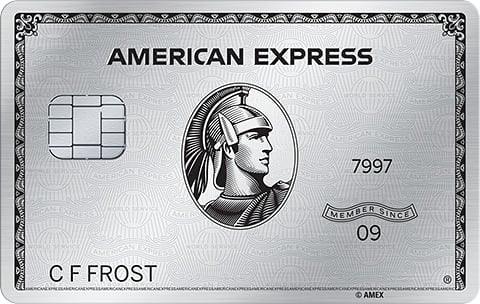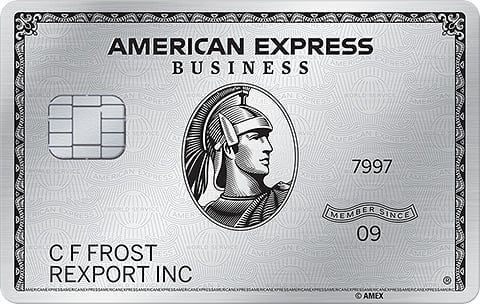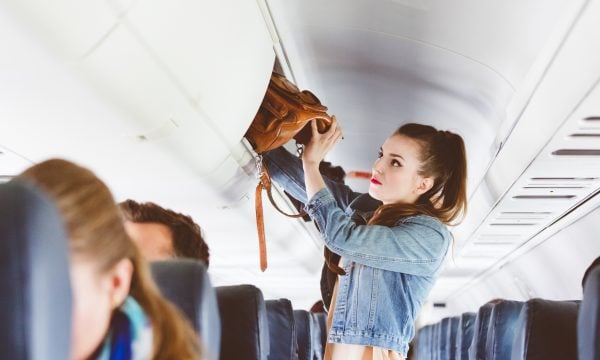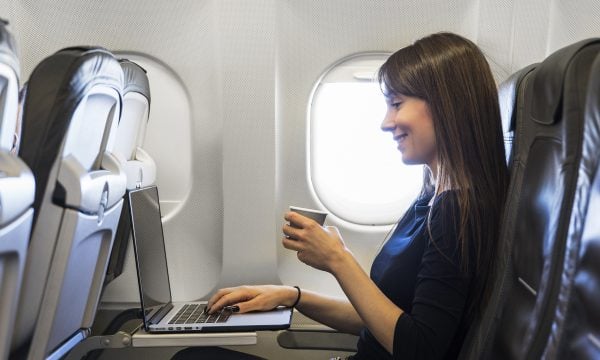The Most Pet-Friendly Airlines
Alaska and Frontier top our list, but regardless of airline, flying with a pet will be expensive.
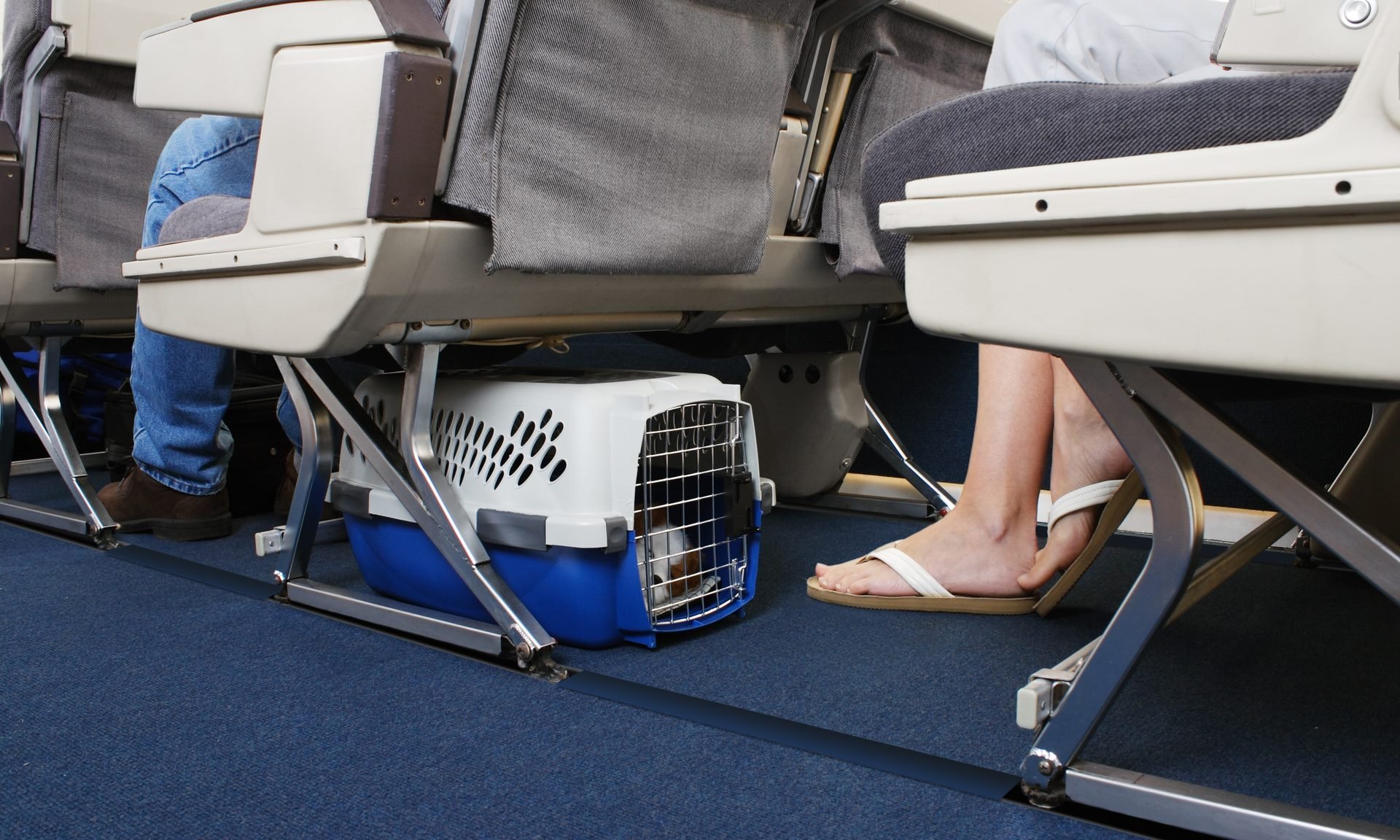
Many or all of the products on this page are from partners who compensate us when you click to or take an action on their website, but this does not influence our evaluations or ratings. Our opinions are our own.
Traveling with a pet can be stressful and expensive, period. And some airlines make it especially so. Some airlines that used to happily ship your pet in cargo will transport them no more. Your emotional support animal likely can no longer fly for free.
We analyzed nine U.S. airlines on 12 variables to find the most pet-friendly airlines. We combed through the fine print, fees and policies of all the major airlines to find which ones charge the lowest fees, are the most flexible in terms of what pets you can bring and how well they handle pet transport.
And the reality is, flying with pets is a bleak undertaking with almost any airline. Of the nine airlines we rated on a five-point scale, only one really stands out as any good — our winner, Alaska Airlines. Only one other option, Frontier, scored higher than a 3. Every other airline fell below that.
Here are the best airlines for traveling with a pet.
The official rankings
We analyzed the same nine U.S. airlines that were reviewed as part of NerdWallet's greater Best Of Airlines rankings. There are certainly other, smaller airlines that can often be better for pets (JSX is a great air carrier for pets), but they weren't included in our official rankings because they didn't meet all the criteria for consideration (namely too small of a network to be relevant to most people).
NerdWallet's rankings considered factors including whether pets are allowed, the average pet fee and airline safety records to determine what airline is best for pet travel.
Get the 'Cheat Codes' to Cheaper Travel
Unlocking the secret to saving a ton on travel is easier than you think. 📤 Our free newsletter shows you how in 5 min. or less.

Here are the airlines we reviewed and the overall rankings of each:
Which airlines are pet-friendly? The simple answer is Alaska — and to some extent Frontier — offers the best overall experiences for flyers with pets, according to NerdWallet's analysis.
Here's a snapshot of some of the data we collected to help you plan for flying with dogs, cats and other pets.
| Cost for main cabin pet transportation | Number of pets allowed per passenger | Types of animals allowed in main cabin | |
|---|---|---|---|
| Alaska Airlines | $100 (per carrier, with up to 2 per carrier). | 4 (if you purchase an adjacent seat, otherwise two). | Dogs, cats, rabbits and household birds. |
| American Airlines | $150. | 2. | Cat or dog. |
| Delta Air Lines | $95. | 1 (Two if between the age of 10 weeks and 6 months and they can fit in a single carrier). | Dogs, cats and household birds. |
| Frontier Airlines | $99. | 1. | Domesticated dogs, cats, rabbits, guinea pigs, hamsters or small household birds. |
| Hawaiian Airlines | $125 between Hawaii and North America. $60 within Hawaii. | 1 (Two puppies or kittens of the same breed or litter between 8 weeks and 6 months old, weighing 25 pounds or less). | Cat or dog. |
| JetBlue Airways | $125. | 2 (Only one pet per carrier. You can travel with two pets, but you must book and pay for the second seat and pet fee). | Cat or dog (maximum of six pets per flight; not available in Mint). |
| Southwest Airlines | $125 (refundable). | 2 (if in the same carrier). | Cat or dog (maximum of six pets per flight). |
| Spirit Airlines | $125 each way, plus an additional $125 charge for each stopover of more than four hours within the U.S. | 2 (if in the same carrier). | Dogs, cats, rabbits and household birds. |
| United Airlines | $125 each way, plus an additional $125 charge for each stopover of more than four hours within the U.S. | 2 (with purchase of a second ticket). | Cat or dog. |
Airlines typically charge from $95 to $125 each way per pet, with the average being $118. Across the major airlines, you'll find the lowest pet fees at Delta ($95 each way), Frontier ($99 each way) and Alaska ($100 each way).
(Editor's note: Following the initial publication of this analysis, United announced it would be raising its fee to $150 for tickets purchased on or after April 26, 2024.)
The best airlines for dogs, cats and other pets
1. Alaska Airlines
Alaska Airlines is the best airline for traveling with a pet. While not the absolute lowest, it had among the lowest fees and the most flexible pet policy in terms of what types of pets you can bring.
Traveling the main cabin
Alaska has among the lowest pet fees for the main cabin, charging $100 each way per kennel or carrier. Since up to two pets of the same species and similar size may travel in the same carrier, that’s just $50 per pet if traveling with two.
Theoretically, you can fly with up to four pets. The Alaska pet policy lets you bring up to two pet carriers in the main cabin, but that gets pricey as you’ll have to purchase the adjacent seat too. But at least if you’ve got quite a menagerie to transport, it’s possible.
While many airlines restrict main cabin pets to cats and dogs only, Alaska is more flexible, allowing rabbits and household birds, too.
Like most airlines, your pet carrier also counts toward your carry-on bag allotment, so plan to check bags — or pack light.
Traveling in checked baggage or cargo
If your pet is too large to fit under the seat, it can travel in the climate-controlled baggage compartment within the U.S. for $150.
Lounging before your flight
If you’re heading to an Alaska lounge, your pet can come too — as long as it’s well-behaved. The lounges, which are accessible to passengers with certain levels of elite status or people who purchase a separate membership, accept quiet service animals and pets in carry-on kennels.
2. Frontier Airlines
Frontier doesn’t often win many awards, but it does handle pets better than many other airlines. One big reason is that while other airlines will fly cats and dogs only, Frontier accepts rabbits, guinea pigs, hamsters and small household birds, too (though international flights still limit pets to cats and dogs only).
Pet fees are a nonrefundable $99 per pet, per direction.
The biggest downfall of Frontier’s pet policies is that the airline won’t let your pet fly in the baggage compartment or cargo (main cabin only). That means your pet must be small (and calm) enough to remain underneath your seat. With Frontier, maximum pet container dimensions are 18 inches by 14 inches by 8 inches.
How to cover pet expenses with a credit card
There are no pet-specific travel cards (yet) that specifically cover the cost of flying a furred or scaled friend. Yet several cards do offer incidental travel credits that can be used to cover these fees.
Here are some of our favorites:
Annual fee
$895.
$895.
$550
$95.
Airline incidental benefit
Up to $200 annually with your preferred airline. Enrollment required. Terms apply.*
Up to $200 annually with your preferred airline. Enrollment required. Terms apply.
Up to $250 annually with your preferred airline. Enrollment required. Terms apply.
Up to $100 annually.
Still not sure?
The challenges of traveling with pets
Read the fine print before attempting to travel with pets on a plane.
Even with the most pet-friendly airlines, there are still many restrictions around a pet’s size and how free (or confined to the kennel) they can be when traveling within the main cabin. Some individual routes or aircraft have their own unique limitations beyond the standard airline pet policy. Rules can even vary by state, so your experience flying with the same airlines to another could differ.
Plus, beyond fees, you’ll likely also incur a bunch of paperwork and phone calls before your pet can fly. Here are a few road bumps to watch out for:
You must reserve a spot in advance — so your pet’s travels aren't guaranteed (even if your seat is booked)
Even on the best airline for flying with pets, Alaska, it’s not a guarantee that your pet can fly. That’s because all airlines limit the overall number of pets allowed in the main cabin and cargo. For example, Alaska’s first-class cabin can accommodate only one pet carrier per flight, and the main cabin accommodates up to five.
You’ll generally need to contact the airline to reserve a space for your pet. Always confirm space is available before booking your own seat, as you don’t want to deal with the headache of canceling should there be no room for your pet.
Most airlines force you to pick up the phone and call to reserve your space, which might entail a long hold time. But Southwest scored some extra points in our rankings because it has many ways to reserve your pet’s spot, including via Facebook and Twitter. Southwest encourages sending a direct message on Twitter to @Southwestair or via Facebook private message your confirmation number to reserve your pet’s spot.
Emotional support animals are no longer recognized as service animals
In past years, you may have traveled with your emotional support animal for free. That’s no longer the case. These days, all pets are subject to pet policies and fees on all of the major airlines we reviewed.
That’s due to a December 2020 ruling from the U.S. Department of Transportation that eliminated a requirement that airlines allow emotional support animals free of charge. By early 2021, all of the major airlines announced that they would no longer recognize emotional support animals as necessary for air travel.
Certified service animals are still permitted at no additional cost under the Air Carrier Access Act.
» Learn more: The latest in travel news
Fewer airlines will transport your pets in cargo or checked baggage
Of the major U.S. airlines, only Alaska, American and Hawaiian will transport pets in checked baggage and/or cargo.
In the early days of the pandemic, United suspended its pet cargo services and has yet to resume them. Other major airlines, including Southwest Airlines and Spirit Airlines, never accepted pets in cargo.
Other reasons airlines might not let your pet fly
Flying, even on our highly ranked airlines, can be annoyingly uncertain. Other reasons airlines may not let your pet fly include:
It’s the holiday season: Some airlines don’t accept pets in the baggage or cargo compartments during holiday travel periods. Check with your airline.
Your pet is a certain breed: Most airlines won't transport brachycephalic or "short-nosed" dogs and cats in cargo, though they might still be allowed in carry-on.
“Veterinary experts say that short-nosed animals commonly have abnormalities that can compromise their breathing,” according to Alaska. “Stress associated with flight can make those conditions worse.”
If you’re flying with one of those breeds, which includes pit bulls, Boston terriers and many types of bulldogs and pugs, check the airline’s specific policy.
You don’t have proper paperwork: Most airlines require a valid health certificate issued by your vet, certifying that your pet is fit to fly. Most airlines also require proper vaccines.
Some only require it for cargo, but not main cabin flying. Check with your airline before boarding.
Your pet isn’t behaving: Most airlines will deny boarding to misbehaving pets. The definition of a poorly behaved pet can be subjective, but most airlines outline growling, excessive whining or barking, or urinating or defecating in the cabin or gate area as reasons.
Even if your pet is an angel at home, don’t assume it will behave the same way at an airport. Have a backup plan if there’s any chance your pet will be unpredictable on a plane.
Airlines that allow dogs, cats and other pets, recapped
Animal air travel is far from a walk in the park. Sometimes, the fee to store your pet under the seat in front of you (while sacrificing your own precious legroom) is pricier than your own airfare. Before arriving at the airport, expect paperwork to sign and phone calls to make. Upon arrival, there’s a chance you’ll be denied boarding if the gate agent hears or sees any disruptive behavior.
If you must fly with a pet, but the restrictions feel burdensome, consider skipping the commercial aircraft entirely. Some private and semi-private jets such as JSX won’t clamp down on breeds or sizes, and won’t make you wrestle your way through security with a pet in tow.
When it comes to air travel with pets, you don’t exactly have your pick of the litter. Alaska was the best of the bunch, but even animal travel on Alaska has limitations. Know what you’re getting into before planning a flight with a pet. And accept that sometimes a road trip (or even a private jet) might be better.
Methodology: How we made our pet-friendly airline rankings
We gave each airline a score from 1 to 5 across 12 categories. Some categories received more weight than others (e.g., we gave more weight to the number of death, loss and accident reports since safety is paramount compared with saving $10 on a lower fee to fly your pet in cargo).
Here are our complete rankings.
Here are the primary factors we considered:
- Cost for main cabin: How much does it cost to bring pets in the main cabin?
- Refunds, accessibility and ease: Were pet fees refundable? What sorts of limits are there on allowing pets in lounges? How easy is it to book a space for your pet on the flight?
- Number of pets allowed per passenger: If pets were allowed in the main cabin, how many you can bring?
- Types of animals allowed in the main cabin: Can you fly with a pet bird? We gave higher points when species other than cats and dogs are allowed.
- Allow pets in cargo: Whether pets are allowed to travel in cargo, in any capacity.
- Cost for cargo, if even possible: Whether pets are allowed in checked baggage or cargo, and, if so, how much it costs.
- Injuries, deaths or lost pets: We looked at Department of Transportation data from June 2021 to May 2022 for reports of deaths, injuries or losses of pets shipped via cargo. We normalized the data relative to overall passenger count to avoid penalizing larger airlines that might have more reports because they transport more animals.
We didn't factor in pet-friendly international airlines, as those policies can also vary significantly.
*More from American Express
American Express relies on airlines to submit the correct information on airline transactions to identify incidental fee purchases. If you do not see a credit for a qualifying incidental purchase on your eligible Card after 8 weeks, simply call the number on the back of your Card. Qualifying airlines are subject to change. See terms & conditions for more details
To view rates and fees of the American Express Platinum Card®, see this page.
To view rates and fees of The Business Platinum Card® from American Express, see this page.
All information about the Hilton Honors American Express Aspire Card has been collected independently by NerdWallet. The Hilton Honors American Express Aspire Card is no longer available through NerdWallet.
How to maximize your rewards
You want a travel credit card that prioritizes what’s important to you. Here are some of the best travel credit cards of 2026:
- Flexibility, point transfers and a large bonus: Chase Sapphire Preferred® Card
- No annual fee: Wells Fargo Autograph® Card
- Flat-rate travel rewards: Capital One Venture Rewards Credit Card
- Bonus travel rewards and high-end perks: Chase Sapphire Reserve®
- Luxury perks: American Express Platinum Card®
- Business travelers: Ink Business Preferred® Credit Card
Article sources
NerdWallet writers are subject matter authorities who use primary,
trustworthy sources to inform their work, including peer-reviewed
studies, government websites, academic research and interviews with
industry experts. All content is fact-checked for accuracy, timeliness
and relevance. You can learn more about NerdWallet's high
standards for journalism by reading our
editorial guidelines.
Limited Time Only: Earn $1,000 Toward Travel!
Capital One Venture Rewards Credit Card 
Travel

For a limited time, the
Capital One Venture Rewards Credit Card is offering new cardholders an especially rich bonus: Enjoy $250 to use on Capital One Travel in your first cardholder year, plus earn 75,000 bonus miles once you spend $4,000 on purchases within the first 3 months from account opening - that’s equal to $1,000 in travel!
More like this
Related articles



